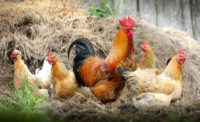The U.S. Department of Agriculture’s Animal and Plant Health Inspection Service has confirmed the presence of highly pathogenic avian influenza (HPAI) in two flocks in Minnesota — a commercial turkey flock in Meeker County and a backyard mixed species flock (non-poultry) in Mower County.
Samples from the Meeker County flock were tested at the Minnesota Poultry Testing Laboratory and samples from the Mower County flock were tested at the University of Minnesota Veterinary Diagnostic Laboratory, both part of the National Animal Health Laboratory Network, and confirmed at the APHIS National Veterinary Services Laboratories (NVSL) in Ames, Iowa
APHIS is working closely with state animal health officials in Minnesota on a joint incident response. State officials quarantined the affected premises, and birds on the properties will be depopulated to prevent the spread of the disease. Birds from the flocks will not enter the food system.
According to the U.S. Centers for Disease Control and Prevention, the recent HPAI detections do not present an immediate public health concern. No human cases of these avian influenza viruses have been detected in the United States.
As part of existing avian influenza response plans, Federal and state authorities are working jointly on additional surveillance and testing in areas around the affected flocks, and USDA is working with its partners to actively look for the disease in commercial poultry operations, live bird markets and in migratory wild bird populations
Anyone involved with poultry production from the small backyard to the large commercial producer should review their biosecurity activities to assure the health of their birds. APHIS has materials about biosecurity, including videos, checklists and a toolkit.
USDA will report these findings to the World Organisation for Animal Health (OIE) as well as international trading partners. USDA also continues to communicate with trading partners to encourage adherence to OIE standards and minimize trade impacts. OIE trade guidelines call on countries to base trade restrictions on sound science and, whenever possible, limit restrictions to those animals and animal products within a defined region that pose a risk of spreading disease of concern. OIE trade guidelines also call on member countries to not impose bans on the international trade of poultry commodities in response to notifications in non-poultry.
APHIS will continue to announce the first case of HPAI in commercial and backyard flocks detected in a state but will not announce subsequent detections in the state. All cases in commercial and backyard flocks will be listed on the APHIS website.
Source: USDA

.png?height=200&t=1665625029&width=200)
